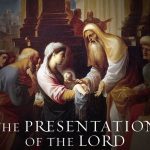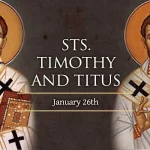Aug 25 Monday: Saint Louis & Saint Joseph Calasanz, priest. Mt 23:13-22
Today’s Gospel places us in the third day of that first Holy Week, when Jesus faced heated confrontation with the religious leaders. In Matthew 23, Jesus begins pronouncing His series of “woes” against the scribes and Pharisees, publicly exposing their hypocrisy. It is a powerful moment, both sorrowful and fierce, showing Christ’s grief over leaders who distort God’s Law for self-interest. In Matthew’s community, some Jewish Christians argued that Gentile converts must observe the full Torah and oral traditions. Matthew recalls Jesus’ teaching here to warn them: salvation does not come from legalism, but from faith lived with integrity.
The sins of the scribes and Pharisees: Jesus accuses them of three main failures. First, they do not practice what they preach, creating a religion of words without deeds. Second, they impose heavy burdens through a rigid interpretation of the Law, yet do not lift a finger to help. Third, they seek honor and recognition, delighting in titles and public respect rather than glorifying God. Their hypocrisy lies in presenting external observance as true religion while ignoring the heart of the Law: mercy, justice, and love of neighbor (Micah 6:8, Matthew 23:23). They even manipulated oaths, inventing legal loopholes to escape promises, showing more concern for appearances than truth.
Fathers of the Church and Catechism: St. John Chrysostom noted that Jesus’ anger here is not out of malice but out of wounded love, because “they corrupted the Law which was meant to save” (Homilies on Matthew 72). The Catechism echoes this when it teaches that authentic authority must be exercised “as a service” and never for domination or self-glory (CCC 876).
Life messages
First, Christ desires hearts purified of deceit. We must avoid the “dog-in-the-manger” attitude, where we fail to live God’s word yet obstruct others from doing so. Second, Jesus warns us against frivolous oaths and all superstition that trivialize God’s name (cf. Matthew 5:37, James 5:12). Finally, we are reminded that discipleship is not about appearances, but about integrity: living in such a way that our lives reflect God’s mercy and truth. God bless you.
Aug 26. Tuesday:Mt 23:23-26
Matthew 23 continues to resound with the thunder of Jesus’ sorrowful anger at the hypocrisy of the Pharisees. In today’s Gospel, we hear the fourth, fifth, and sixth “woes.” These focus on misplaced priorities: excessive attention to minor practices like herb tithing, exaggerated zeal for ritual detail, and obsession with outward cleanliness, while neglecting the heart of true religion. For Jesus, the essence of faith is not in external observances, but in offering God a clean heart, filled with justice, mercy, compassion, and forgiveness (Psalm 51:10, Hosea 6:6).
The fourth woe condemns the Pharisees for tithing mint, dill, and cumin kitchen herbs not even required by the Law, while ignoring what Jesus calls “the weightier matters of the Law: justice, mercy, and faith” (Matthew 23:23). Tithing was meant to recognize God’s ownership of everything and provide for the poor, but the Pharisees missed its spirit. The fifth woe denounces their scrupulous filtering of drinks to avoid swallowing an unclean insect, while they “swallow a camel,” committing far greater sins without repentance (Matthew 23:24). The sixth woe targets their obsession with external ritual purity. They polish cups and dishes outwardly, but inside they are full of greed, pride, and injustice. Jesus insists that real holiness begins in the heart, for “Blessed are the pure in heart, for they shall see God” (Matthew 5:8).
The Fathers and the Church: St. Augustine explained that “by caring for trifles and neglecting weightier matters, they upset the right order of love” (Sermon 62). Origen warned that when people cleanse only the exterior, “their religion becomes a disguise rather than a reality.” The Catechism reminds us that purity of heart is not simply freedom from sin, but the ability to see and act according to God’s truth (CCC 2518). God bless you.
Life messages
First, we must avoid becoming “modern Pharisees,” who display devotion outwardly but harbor pride, injustice, or uncharity within. God desires integrity of life, where our outward practices reflect an inward love for Him and others. Second, we are often tempted to advertise our good works while hiding our faults, but Jesus calls us instead to sincere humility. Finally, authentic faith expresses itself in agape love, sacrificial service to others, because love of God is inseparable from love of neighbor (1 John 4:20).
Aug 27. Wednesday: Saint Monica. Mt 23:27-32
Today’s passage (Matthew 23:27-32) concludes Jesus’ series of “woes” against the scribes and Pharisees in the Temple during the climactic days of His final week in Jerusalem. These last two indictments strike at the core of hypocrisy, showing the gap between outward appearances and inner reality.
Hypocrisy exposed: In the seventh woe, Jesus compares the Pharisees to whitewashed tombs. Before the great Jewish feasts, tombs around Jerusalem were freshly whitewashed to warn pilgrims not to step on them, lest they become ritually defiled (Numbers 19:16). Outwardly bright and clean, the tombs hid death and decay within. In the same way, Jesus accused the Pharisees of presenting themselves as pious and holy while harboring corruption, pride, and injustice in their hearts. Their holiness was a mask. As St. Paul would later write, “They have the appearance of godliness, but deny its power” (2 Timothy 3:5).
The eighth and final woe exposes a different form of hypocrisy: false zeal for the prophets. The Pharisees built and decorated monuments for the prophets killed by their ancestors, yet failed to repent of the same hardness of heart that led to those murders. In honoring the dead prophets, they ignored the living Prophet standing before them, Christ Himself. As Jesus points out, they were repeating the sins of their forefathers rather than learning from them. Their admiration for the prophets was superficial, since it did not lead to conversion.
The Fathers and the Church: St. John Chrysostom warns: “You have been counted worthy to become temples of God. But you have instead suddenly become more like sepulchers… carrying a dead soul in a living body.” (Homily on Matthew 73). Augustine likewise cautioned that honoring prophets and saints while ignoring their message is a dangerous self-deception, saying, “They crown the martyrs with words, yet persecute them with their lives” (Sermon 23A). The Catechism echoes this in teaching that integrity requires the harmony of interior and exterior life, without duplicity (CCC 2468).
Life messages
- These woes invite us to examine whether our Christianity is only skin-deep. Do we appear holy to others while remaining unconverted inside? God calls us to integrity, where our hearts match our words and actions.
- We should be careful not to honor saints, martyrs, or even our own Christian ancestors only with outward gestures while failing to live the Gospel they died for. True reverence means imitation.
- Finally, we must pray for the grace of transparency before God. Holiness is not a performance but a transformation of the heart by His Spirit. As Jesus teaches, “Blessed are the pure in heart, for they shall see God” (Matthew 5:8). God bless you.
Aug 28 Thursday: Saint Augustine, bishop and doctor of the Church. Mt 24:42-51
The central theme of today’s Gospel is the necessity of living with faithful vigilance as disciples of Christ. Jesus tells two short parables in which the master represents the risen Lord and the servants symbolize His followers, including us. The warning is clear: the Son of Man will come at an unexpected hour (Matthew 24:42-51, Luke 12:35-48). According to the Fathers of the Church, these words have a twofold meaning. In the narrower sense, they point to the Second Coming of Christ at the end of time. In the broader sense, they remind us of the hour of our own death, when each of us will be called to stand before God and give an account of our stewardship (Hebrews 9:27).
Faith and vigilance in daily life: In the passage before today’s Gospel, Jesus uses the image of a thief who comes in the night to emphasize how sudden His return will be. Just as no one knows when a thief might strike, so too we do not know the hour of God’s visitation. To lose the treasure of divine grace through negligence is to awaken one day spiritually bankrupt. In today’s parable, Jesus compares His followers to stewards entrusted with the care of their master’s household. In the ancient world, such a steward had serious responsibilities: feeding the household, managing the estate, and ensuring order in the master’s absence. The faithful servant remained alert, carrying out his duties with diligence, ready at any moment for his master’s return. By contrast, the unfaithful servant became complacent, abusing others, indulging in drunkenness, and forgetting that judgment would surely come. His downfall came precisely because he presumed upon delay.
Witness of the Fathers: St. Cyril of Alexandria explains that Jesus calls us to vigilance not out of fear but out of love, so that “our hearts may be ever watchful, our works upright, and our souls unafraid to meet the Judge.” St. Augustine echoes this when he writes: “He who loves the coming of the Lord is not the one who says it is far off, nor the one who says it is near, but the one who waits for it with a faithful heart and a good conscience” (Sermon 93).
Life message
- These parables are directed to every Christian. Since neither the day of the Lord’s coming nor the hour of our death is known, we must live in readiness. Jesus should find us faithful, persevering in love, mercy, and service rather than postponing good works or leaving duties undone.
- True vigilance is not passive waiting but active fidelity. It means being at peace with God, reconciled with our neighbor, and diligent in our responsibilities (Ephesians 4:26).
- Above all, we are called to live each day as though it were our last, not in fear, but in the joyful readiness of servants who long to welcome their Master home. God bless you.
Aug 29 Friday;Beheading of Saint John the Baptist, martyr: Mk 6:17-29 (Martyrdom of John the Baptist)
Today’s Gospel presents the tragic final act in the drama involving three central figures: Herod, Herodias, and John the Baptist.
Herod Antipas, the tetrarch of Galilee, was a weak ruler, more concerned with appearances and power than with truth. The Gospels describe him as curious about John yet deeply unsettled by his preaching (Mark 6:20). His guilty conscience, combined with fear of public opinion, made him both fascinated by and resentful of John. His marriage to Herodias, his brother Philip’s wife and also his niece, violated Jewish law (Leviticus 18:16; 20:21). Instead of repenting, he silenced the prophet’s voice, holding John in prison while still sensing that he was “a righteous and holy man.”
Herodias, by contrast, embodies hard-heartedness. She could not endure John’s condemnation of her unlawful union. Her grudge turned into hatred, and hatred matured into murder. Like Jezebel against Elijah, she schemed against the prophet of God. Her triple guilt was grave: unfaithfulness, vengefulness, and corruption of her own daughter by using her as an instrument of seduction and bloodshed.
John the Baptist stands as a stark contrast to both. He was the last and greatest of the prophets (Matthew 11:11), a fiery preacher who prepared the way for the Messiah. Fearless in speaking truth, John confronted sin even at the cost of his freedom and his life. St. Bede the Venerable comments: “John died for Christ, though Christ had not yet died for John; he went before Christ in death, as he had gone before Him in birth” (Homilies on the Gospels). His martyrdom foreshadows the Cross, where truth and innocence are crushed by worldly power, yet ultimately vindicated by God.
God’s justice: History records that Herod’s sins caught up with him. He was later defeated in battle by King Aretas, the father of his first wife, and both Herod and Herodias were eventually exiled to Gaul by the Roman Emperor Caligula. Their worldly ambitions crumbled, while John, though silenced by death, continues to speak across the centuries as a witness to truth.
Life message
- Like John, we are called to courage in speaking the truth of the Gospel, even when it is inconvenient or costly. Silence in the face of injustice or sin can be complicity.
- The figures of Herod and Herodias warn us against the dangers of pride, lust, and vengeance, which blind the heart and harden it against God’s word.
- John reminds us that fidelity to God sometimes requires sacrifice, but martyrdom, whether in blood or in daily witness, always bears fruit for the Kingdom. As Tertullian famously said, “The blood of martyrs is the seed of the Church.” God bless you.
Aug 30 Saturday: Mt 25:14-30
The Parable of the Talents
In Matthew 25, Jesus presents three parables about the end times: the Wise and Foolish Virgins, the Talents, and the Last Judgment. Each one urges us to be vigilant and faithful stewards as we await the coming of the Lord. The parable of the talents, in particular, is an invitation to live responsibly, making the best use of the gifts God has entrusted to us. At the end of our lives, may we hear those consoling words: “Well done, good and faithful servant… Come, share your master’s joy” (v. 23).
The Story
A wealthy man prepares for a long journey and entrusts his servants with vast sums of money. To one he gives five talents, to another two, and to another one, “each according to his ability” (v. 15). A single talent was worth about 20 years of wages, underscoring the immense trust placed in them. The first two servants work diligently and double the amount given. The third, fearful and lazy, buries his talent in the ground. When the master returns, he rewards the industrious servants with greater responsibility and joy but condemns the unfaithful one as “wicked and slothful” (v. 26).
Scriptural and Patristic Insights
- God’s trust in us: This parable shows that God places immense trust in each of us, giving us gifts proportionate to our capacity. St. John Chrysostom notes that God does not demand the same from everyone but judges each according to their measure of grace and effort (Homily on Matthew 78).
- The danger of fear and sloth: The third servant represents those who, out of fear or laziness, refuse to act. St. Augustine warns that failing to use God’s gifts is itself a form of injustice: “Not to give what you have received is to take away” (Sermon 23A).
- Final accountability: Just as the master returns, so Christ will return to judge us. The Catechism reminds us: “When the Lord comes in glory, he will bring to completion the definitive triumph of good over evil” (CCC 681).
Life Messages
- Trust God enough to use your gifts.
Everyone receives different gifts, whether intelligence, compassion, leadership, creativity, or practical skills. What matters is not how many we have but whether we use them faithfully. We should ask ourselves: Am I using my talents in service of God, my parish, and society, or am I burying them in fear and comfort? - Use your gifts in the Church and beyond.
Our gifts are not meant to be hidden but to build up the Body of Christ (1 Corinthians 12:4–7). In parish life, this may mean serving in liturgy, teaching catechism, visiting the sick, or engaging in outreach to the poor. Sharing our time and abilities makes the Church more alive and credible in the world. - Trade with the greatest gift: our Faith.
Above all, we have been entrusted with the gift of Faith. Faith must not be locked away as a private treasure. Like the good servants, we are called to multiply it by living it daily, bearing witness in our families, and passing it on to future generations. Pope Benedict XVI wrote: “Faith grows when it is lived as an experience of love received and when it is communicated as an experience of grace and joy” (Porta Fidei, 7).
Conclusion
The parable of the talents is not about financial success but about spiritual fruitfulness. God has invested in us with grace, gifts, and responsibilities. On the last day, our true wealth will not be in what we kept but in what we gave, multiplied, and returned to God through loving service. God bless you.











